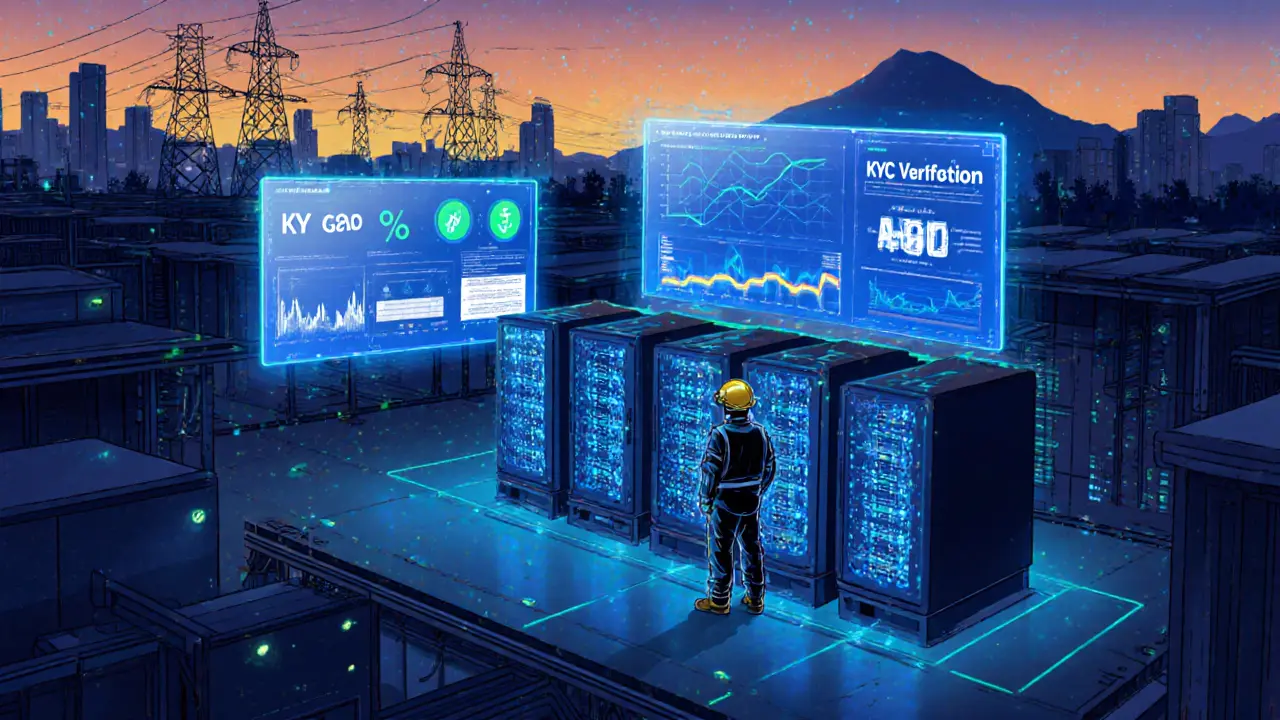
Georgia Crypto Mining License Calculator
Estimated Initial Investment
Incorporation & Licensing:
$0
Annual Renewal Fees:
$0
Monthly Electricity Cost:
$0
Total Estimated Monthly Cost:
$0
AML/CFT Requirements: All licensed entities must implement KYC checks, transaction monitoring, and report suspicious activity to the Financial Monitoring Service within 48 hours.
Compliance Deadline: Full enforcement of AML/CFT rules is scheduled for 2026.
Key Takeaways
- Cryptocurrency mining is legal and tax‑free for individuals in Georgia.
- Commercial miners register a standard company and may need a VASP or FIZ crypto license.
- The National Bank of Georgia (NBG) drives AML/CFT rules; compliance is mandatory by 2026.
- Energy costs are low, especially in mountain regions, but industrial zones offer better infrastructure.
- Getting licensed costs include incorporation, license fees, audits and annual renewals.
Georgia has become a hotspot for crypto mining in Georgia, thanks to clear rules, cheap electricity and a government that actually wants miners to stay. Whether you’re a hobbyist looking for a few rigs or a company planning a megafarm, you need to know which permits apply, how taxes work and what compliance steps are on the horizon.
Regulatory Landscape
At the heart of the system is the Republic of Georgia is a sovereign state in the Caucasus that has positioned itself as a digital‑asset friendly jurisdiction. The National Bank of Georgia (NBG) is the central bank that issues the main crypto‑related regulations, including the Virtual Asset Service Provider (VASP) framework introduced in 2023. Since July2023 the VASP registration law requires all crypto‑businesses to register, and the NBG’s Order94/04 outlines specific AML and CFT obligations that take full effect by 2026.
For miners, the law draws a line between individuals and commercial entities. Individuals enjoy a zero‑tax regime on mined coins because crypto is treated as personal property, not legal tender. Companies, on the other hand, must register under normal commercial law and decide whether a VASP licence or the offshore‑style Tbilisi Free Zone (FIZ) crypto licence is a better fit for their business model. Both pathways demand strict AML/CFT reporting to the Financial Monitoring Service (FMS) that monitors suspicious activity and enforces compliance across the crypto sector.
Licensing Options Explained
Two licences dominate the market:
| Feature | VASP Licence (Mainland) | FIZ Crypto Licence (Free Zone) |
|---|---|---|
| Jurisdiction | Georgia’s national legal framework | Tbilisi Free Zone - offshore‑friendly |
| Tax Treatment | Standard corporate tax (15%) on profits | Tax‑free for qualifying activities |
| Initial Cost (USD) | ≈3,000USD (incorporation + licence) | ≈2,200USD (reduced fees) |
| Annual Renewal | ≈1,200USD | ≈800USD |
| AML/CFT Reporting | Full compliance required | Same reporting standards, but lighter supervision |
| Suitable For | Large‑scale farms, exchanges, VASPs | Start‑ups, offshore‑oriented investors |
Choosing the right licence hinges on your tax goals, the size of your operation and how much regulatory oversight you want. Many miners start with the cheaper FIZ route to test the waters, then switch to a VASP licence when they expand.

Taxation and Compliance Essentials
Georgia treats mined coins as personal property. That means a hobbyist who mines Bitcoin on a home rig pays no tax on the coins themselves. However, if you sell or convert the coins into GEL (the Georgian lari) or foreign currency, the profit becomes a taxable event under standard capital‑gain rules.
Commercial miners must file corporate tax returns and may be subject to the 15% profit tax unless they qualify for the FIZ tax‑free regime. Regardless of tax status, every entity that holds, transfers or exchanges crypto must register with the NBG and implement AML/CFT controls:
- Know‑Your‑Customer (KYC) checks on all users.
- Transaction monitoring for amounts exceeding €10,000.
- Reporting suspicious activity to the FMS within 48hours.
The Anti‑Money Laundering (AML) regulations force miners to keep detailed logs of wallet addresses, energy usage and sales invoices. The Countering the Financing of Terrorism (CFT) rules add a layer of scrutiny on cross‑border transfers, especially when moving large sums into or out of the country. Failure to comply can result in fines, licence suspension or even criminal investigations.
Choosing a Location and Managing Energy Costs
Georgia’s energy mix is a major draw. In 2025, crypto mining consumes just around 2% of national electricity, leaving plenty of headroom. The low‑cost power comes from a mix of hydro‑electric plants in the Caucasus and thermal generators in the lowlands.
Two location models dominate:
- Mountain sites - often in regions like Svaneti or Racha, where electricity can be near‑free and the cool climate reduces cooling expenses. The downside is limited broadband and logistical challenges for large hardware.
- Industrial zones - cities such as Tbilisi, Kutaisi, and Batumi offer robust power grids, high‑speed internet, and access to professional services (security audits, legal counsel). Costs are higher, but scalability is smoother.
When budgeting, factor in a 10-15% premium for cooling infrastructure in warmer locales, and allocate around $0.05-$0.07 per kWh for industrial electricity rates.
Step‑by‑Step: How to Launch a Mining Operation in Georgia
- Define your business model: individual hobbyist, LLC, or partnership.
- Incorporate a company: Register with the Georgian Registrar of Legal Entities; typical cost $500-$800.
- Choose a licence: Apply for a VASP licence or FIZ crypto licence via the NBG portal. Prepare AML policy documents and a security audit report.
- Secure electricity contracts: Negotiate with local utilities (e.g., Telasi, Energo). Obtain a power usage agreement that outlines peak load limits.
- Buy and install hardware: Opt for energy‑efficient ASICs (e.g., Antminer S19 XP) with 30% lower watt‑per‑hash than older models.
- Implement compliance tools: Deploy KYC software, transaction monitoring dashboards, and regular AML training for staff.
- Launch and monitor: Start mining, track hash rate, power consumption, and profitability. Adjust settings to maximize ROI.
- Report to authorities: Submit quarterly AML reports to the FMS and annual tax filings to the Revenue Service.
Following this roadmap keeps you on the right side of the law, protects your assets and maximizes profit potential.
Common Pitfalls and How to Avoid Them
- Ignoring AML obligations - Even if you think your operation is small, the law applies to all entities handling crypto. Use automated KYC solutions.
- Underestimating power costs - Conduct a detailed energy audit before signing contracts; hidden fees can erode margins quickly.
- Choosing the wrong licence - A FIZ licence saves tax but may limit future expansion into regulated services like exchanges.
- Neglecting hardware cooling - Georgia’s climate helps, but summer heat in low‑land zones still demands proper ventilation.
- Skipping legal counsel - Local lawyers familiar with NBG regulations can streamline the licensing process and avoid costly re‑applications.

Frequently Asked Questions
Is crypto mining legal in Georgia?
Yes. Both individual and commercial mining activities are fully legal, and there are no bans on specific coins or algorithms.
Do I need a licence to mine Bitcoin as a hobby?
No licence is required for personal mining. You only need to register a company if you want to run a commercial farm.
What is the difference between a VASP and a FIZ licence?
A VASP licence follows Georgia’s national framework, includes standard corporate tax and full AML supervision. The FIZ licence offers tax‑free status, lower fees, and a lighter supervisory approach, but is limited to activities within the Tbilisi Free Zone.
How much does electricity cost for mining in Georgia?
Industrial rates range from $0.05 to $0.07 per kWh, while some rural hydro‑electric contracts can be near‑zero, especially for small‑scale operations in the mountains.
When will the AML/CFT rules be fully enforced?
Full enforcement is slated for 2026, following the NBG’s phased rollout that began in 2023.


Comments
Fiona Chow
Wow, Georgia really turned its mountains into a crypto‑mining wonderland, huh? If you thought you needed a PhD in geopolitics to start, think again. The government’s actually handing out cheap electricity like candy, and the licensing process looks as smooth as a freshly‑minted block. Just pick a license, file the paperwork, and boom-you're practically mining royalty. Sure, you’ll have to jump through the AML hoops, but that's just a tiny price to pay for the low‑cost power. And if you’re worried about the tax man, individual hobbyists get a sweet tax‑free ride, while companies can pick the free‑zone route for even nicer perks. So, strap in, grab a coffee, and start stacking those coins before the next regulation hits.
Rebecca Stowe
Honestly, this guide makes it feel like anyone can get started-just pick a plan that fits your budget and you’re good to go! The step‑by‑step checklist is super helpful, especially the part about securing electricity contracts early. It’s great to see the emphasis on compliance; staying ahead of the AML rules will save headaches later. Keep the positive vibe, and good luck building your farm!
Kailey Shelton
Seems like another glossy brochure, but I guess cheap power does make it tempting.
Angela Yeager
For anyone weighing the VASP versus FIZ options, consider the long‑term strategic goals. A VASP licence aligns with national regulations and may be preferable if you plan to expand services beyond mining, such as offering exchange or custodial solutions. The FIZ licence, meanwhile, provides a tax‑free environment for pure mining operations and can be a faster route to market if your focus stays narrowly on hash power. Also, keep an eye on the upcoming 2026 AML enforcement deadline; preparing your KYC and transaction monitoring infrastructure now will make compliance far less painful when the rules fully kick in.
Karl Livingston
Let me just say, the depth of this guide is something to behold, and I’m not just blowing smoke. First, the historical context of Georgia’s regulatory shift from a laissez‑faire stance to a structured VASP framework is laid out with crystal‑clear chronology, which is vital for anyone tracing the policy evolution. Second, the dual‑licensing pathways-VASP and FIZ-are dissected not just in terms of fees but also in tax implications, supervisory intensity, and operational flexibility, giving readers a multidimensional decision matrix. Third, the energy cost analysis goes beyond a superficial $0.05 per kilowatt‑hour figure; it delves into regional disparities, the impact of hydro‑electric capacity in the mountains, and the logistical challenges of supply chain continuity in remote zones. Fourth, the AML/CFT requirements are not merely a checklist but are contextualized with practical steps: KYC software integration, transaction monitoring thresholds, and reporting timelines, which demystifies what could otherwise be an intimidating compliance labyrinth. Fifth, the roadmap enumerates concrete legal steps-company registration, documentation preparation, and licensing portal navigation-each paired with realistic timeframes and cost estimates, avoiding the usual vague promises of “it’ll take a few weeks.” Sixth, the article prudently flags the upcoming 2026 enforcement deadline, urging early preparation to sidestep the rush‑hour scramble many jurisdictions experience when regulatory windows close. Seventh, the hardware recommendations emphasize energy‑efficient ASICs like the Antminer S19 XP, spotlighting the cost‑to‑hash ratio, which is a decisive metric for profitability modeling. Eighth, the cooling considerations juxtapose mountain chill against industrial heat, reminding miners that unaccounted‑for thermal management can erode marginal gains. Ninth, the legal counsel note reinforces the value of local expertise-something often overlooked by foreign investors who assume a universal regulatory approach. Tenth, the tax treatment section clarifies that while individuals enjoy a tax‑free status, corporate entities must navigate a 15% profit tax unless they qualify for free‑zone exemptions, thereby shaping the capital structure decisions. Eleventh, the compliance tools list recommends specific KYC platforms and audit software, turning abstract regulatory language into actionable procurement. Twelfth, the energy audit advice warns against hidden fees and contractual fine print that can silently chip away at profitability. Thirteenth, the article’s tone remains neutral yet empowering, avoiding hype while encouraging informed entrepreneurship. Fourteenth, the inclusion of a cost calculator widget invites interactive budgeting, a practical touch that many guides lack. Fifteenth, the FAQ section anticipates common doubts, from licensing necessity to electricity rate variances, pre‑empting repetitive queries. In sum, this guide is not just a static overview; it is a dynamic toolkit that, if followed, equips you with the knowledge, resources, and foresight to launch a mining operation in Georgia with confidence and regulatory compliance.
Kyle Hidding
Alright, let’s cut through the hype. This “guide” is basically a marketing brochure dressed up as a regulatory deep‑dive. The VASP versus FIZ comparison is oversimplified; the hidden bureaucratic friction for the free‑zone licence often involves opaque offshore ties that can trigger cross‑border AML red flags. The cost figures are stale-electricity rates fluctuate wildly, and the “near‑zero” mountain rates are only viable if you have a government‑backed contract, which most foreign operators can’t secure. Also, the AML timeline to 2026 is a smokescreen; many jurisdictions implement de‑facto enforcement well before the official date, meaning you could be caught off‑guard. Bottom line: treat this as a starting point, not a comprehensive playbook.
Andrea Tan
Nice rundown! I appreciate the balanced look at both license types and the practical tips on energy contracts. The note about cooling in mountain sites is especially useful-temperature really does affect hash rates.
Gaurav Gautam
Hey folks, if you’re on the fence, think about the bigger picture. Mining in Georgia not only leverages cheap power, but it also places you in a growing tech ecosystem. The government’s openness can translate into future incentives for renewable energy integration-imagine powering your rigs with pure hydro power. Stay motivated, do the due diligence, and you’ll find that the initial setup is just the first step toward a sustainable operation.
Robert Eliason
Such a nice article.
Cody Harrington
I totally agree with the points made about starting small and scaling up. It’s smart to test the waters before committing massive capital.
Chris Hayes
The guide does a solid job of separating hype from reality. It’s crucial to understand the tax implications before over‑investing.
victor white
One must wonder whether the so‑called “transparent” licensing regime isn’t just a façade, designed to lure foreign capital while the state keeps its levers of control hidden in the shadows. The timing of enforcement dates, the selective disclosure of AML guidelines, and the intricate web of offshore free‑zone protections all hint at a deeper, perhaps less benevolent agenda. Stay vigilant.
mark gray
Just a quick heads‑up: double‑check the electricity contract clauses for any escalation clauses before you sign.
Alie Thompson
While many laud Georgia’s regulatory openness as a beacon for crypto miners, we must pause to consider the broader ethical implications of incentivizing energy‑intensive activities in a region already grappling with environmental concerns. The portrayal of cheap electricity as an unalloyed benefit overlooks the carbon footprint associated with fossil‑fuel based generation that still supplies a portion of the grid, especially during peak demand periods. Moreover, the promise of tax‑free zones can unintentionally foster a race‑to‑the‑bottom mentality among jurisdictions, where the pursuit of short‑term fiscal gains eclipses long‑term sustainability commitments. It is incumbent upon both investors and policymakers to weigh the social costs against the projected profits, ensuring that the pursuit of digital assets does not exacerbate existing inequities or undermine climate goals. In short, a measured, responsible approach is essential.
Samuel Wilson
Excellent synthesis of the regulatory landscape. The structured approach you’ve outlined will undoubtedly aid newcomers in navigating the licensing process efficiently.
Rae Harris
Sure, the guide says it’s all legit, but you’ve got to ask why every country suddenly becomes crypto‑friendly when they see the money flow. Just a thought.
Danny Locher
Great overview! The tip about early AML preparation really resonated-better to be ready than scrambling later.
Emily Pelton
Listen up, everyone!!! If you’re even thinking about mining in Georgia, you NEED to read THIS guide thoroughly!!! It covers every angle-legal, financial, technical-so you don’t waste time, money, or get into trouble!!! Follow the steps, stay compliant, and you’ll be mining successively!!!